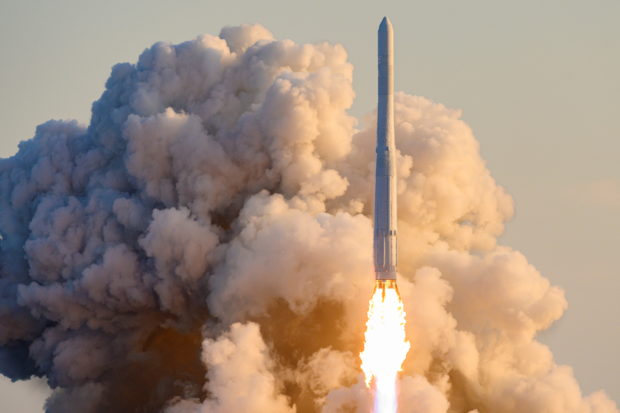S.Korea’s Moon vows ‘Korean space age’ after mixed rocket test results

KSLV-II NURI rocket launches from its launch pad of the Naro Space Center in Goheung, South Korea, October 21, 2021. Yonhap via REUTERS
GOHEUNG, South Korea — South Korea’s first domestically built space rocket blasted off on Thursday, but failed to fully place a dummy satellite into orbit, delivering mixed results for a test launch that represents a major leap for the country’s ambitious space plans.
The three-stage KSLV-II Nuri rocket, emblazoned with the national flag, rose on a column of flame from its launchpad at Naro Space Center at 5 p.m.
The Nuri, or “world”, rocket is designed to put 1.5-ton payloads into orbit 600 to 800 km (370 to 500 miles) above Earth, as part of a broader space effort that envisages the launch of satellites for surveillance, navigation, and communications, and even lunar probes.
President Moon Jae-in, who watched the launch from the space center, said the rocket completed all its flight sequences but failed to place the test payload into orbit.
“Unfortunately, we did not fully reach our goal,” he said in a speech at the site.
Moon praised the workers and said despite the incomplete mission, the project would press ahead.
“It’s not long before we’ll be able to launch it exactly into the target trajectory,” he said according to a transcript. “The ‘Korea Space Age’ is approaching.”
Overseen by the Korea Aerospace Research Institute (KARI), the 200-ton rocket was moved to its launch pad on Wednesday and raised into position next to a towering green support structure perched on a launch pad over cliffs that drop into the sea.
The rocket’s three stages are powered by liquid-fuel boosters built by an affiliate of South Korea’s Hanwha conglomerate, with a cluster of four 75-ton boosters in the first stage, another 75-ton booster in the second, and a single 7-ton rocket engine in the final stage.
KARI said it plans to conduct as many as five more test launches before the rocket regularly carries real payloads.
The next test is currently scheduled for May 19.
Space launches have long been a sensitive issue on the Korean peninsula, where North Korea faces sanctions over its nuclear-armed ballistic missile program.
South Korea’s plans call for launching a range of military satellites in future, but officials deny that the NURI has any use as a weapon itself.
The country’s last such rocket, launched in 2013 after multiple delays and several failed tests, was jointly developed with Russia.
Having its own launch vehicle will give South Korea the flexibility to determine payload types and launch schedules, and benefits South Korean companies, officials told Reuters.














